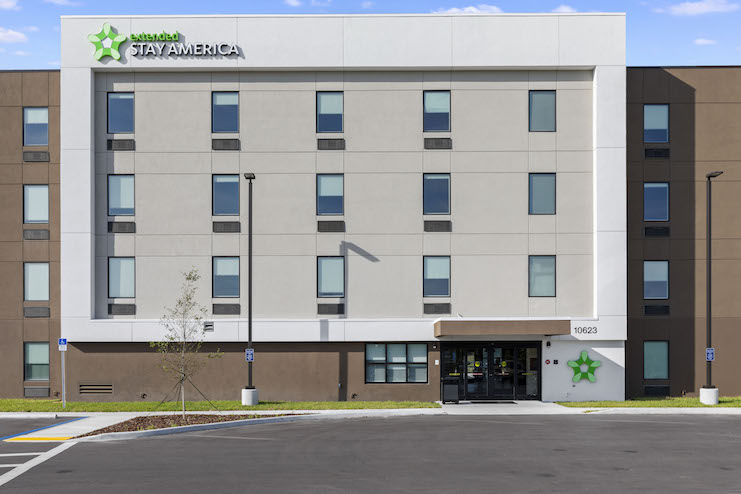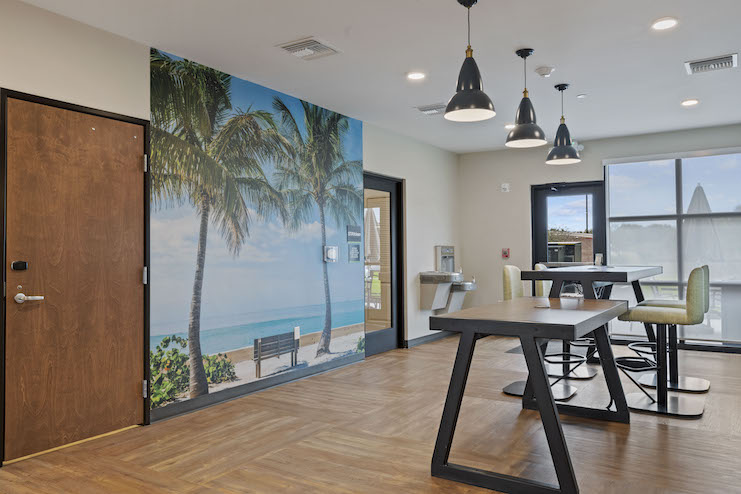Extended Stay America celebrated the grand opening of its newest company-owned hotel on January 15 and the debut of its new prototype—the mid-priced, extended-stay brand’s first in over a decade. The Extended Stay America Gibsonton, Fla., marks the company’s ninth hotel in the Tampa-St. Pete metro area and its southernmost location on Florida’s west coast.
Jim Alderman, chief development officer, told LODGING that ESA chose the Gibsonton location to maintain operational density, a mission consistent with the brand’s streamlined model. “Part of what helps us and drives value for our shareholders is to keep operating costs down at the property, district, and regional level,” Alderman explained. “We wanted to continue to build out the estate down the west coast of Florida, which has some of the fastest-growing counties in the entire country.”
The new asset also allows the company to showcase its ESA 2.0 prototype to potential franchisees looking to build in the fast-growing region. After 25 years of owning and operating its own hotels, in 2017, ESA began opening franchise opportunities to third-party owners. The company has plans to open its own hotels in Port Charlotte, Palmetto, and North Tampa, with additional franchise opportunities in between to expand the brand’s footprint in Florida. Most of this development will follow the new prototype. Alderemand said that ESA plans to open one new-build a month between now and the end of 2020, with additional conversions in the works.

Located in the southern part of Hillsborough County, the Gibsonton property is currently the sole hotel at its I-75 exit. Situated right off the highway, it’s positioned pick up medical demand and business driven by the area’s military bases, major ports, and large corporations including the adjacent Ring Power and nearby Mosaic, one of the world’s largest fertilizer producers.
ESA tapped into its experience as owners/operators of more than 500 assets to develop its new prototype, which has been in the works for the past few years. Paul Fraser, vice president of construction and design, said that the team synthesized input from its development group, operations, and other sectors, considering everything from design elements to products. “When you evaluate cost, efficiency, and quality, it’s coming up with a product that’s going to meet the needs of our guests, which are pretty demanding on our hotels, as well as something that’s easy to clean and maintain from our operations perspective that’s going to hit the life expectancy of our design.”
“We’re experiencing everything that the franchisee is experiencing, so when they have questions or problems, we have answers and solutions.”
For instance, each room in the four-floor, 124-room Gibsonton hotel includes a kitchen with a full-size refrigerator, a cooktop with a 30-minute shutoff feature to ensure guest safety, a microwave, and open shelving that is more efficient for housekeeping to clean and easier for guests to store and access their belongings. Additionally, the open shelving throughout the room cuts down on the wear and tear that comes with opening and closing cabinet doors. LED lighting, low-flow fixtures, and motion-sensing Verdant wall thermostats provide additional operational efficiencies and cost savings while meeting or exceeding today’s building requirements.
Another design shift in ESA’s new prototype is the replacement of odor-absorbing carpets and curtains with solid surfaces and blackout shades. To further freshen the room, the Gibsonton property has a DOAS (dedicated outdoor air system) on its roof to cycle in fresh air and remove humidity. “We’re trying to make it as durable and resilient as we can for [our operations] team to be able to design the best way to clean these and most efficient way possible, which goes to our very limited staffing on our business model,” Alderman explained.
Randy Fox, executive vice president of property operations, said that guests’ demands for fresh, bright, and clean spaces directly translates to ESA’s operating model. “How long does it take to clean this room? If it takes a long time, our franchisees aren’t going to be happy because they have to pay for that. We as a company own assets, so we have to pay for that,” Fox said, adding that in addition to profitability for franchisees, time and cost savings translate to better amenities for guests. Amenities at the Gibsonton property include free WiFi, onsite parking, a gym, a coin and card-operated guest laundry room, and a lobby area where the hotel serves complimentary breakfast and provides additional vending options.

ESA built operational efficiencies into the new prototype’s back end as well, allowing properties like Gibsonton to limit staff to 15 employees—mostly housekeeping and front-desk staff. “Having all the experience that we have, we’re able to sit down with operations and find out what their needs were from a back of house standpoint,” Fraser said. For example, designing a grab-and-go coffee breakfast that “takes as little effort as possible” or staggering washers and dryers so laundry staff spend less time transferring linens. “That helps the operations team […] get in and out as fast as possible,” Fraser explained.
From a franchise standpoint, ESA’s prototype has built-in flexibility. Room types range from a 263-square-foot single queen room to a larger double queen room with a pony wall between the beds to provide more privacy for traveling colleagues who share a room—a common guest type for the brand. In the standard 124-room prototype, double queen rooms are the same square footage as studio rooms, so franchisees can add a second bed to convert studios into double queen rooms without changing the construction or design. “They can flex the room types based on what the demand is for the markets they want to be in and have more queen-queen rooms or fewer queen-queen rooms,” Fraser said.
Cost per key for the Gibsonton property totaled about $61,000, excluding land, with FF&E coming in at approximately $12,500. Fraser noted that the company leverages its purchasing power as an owner/operator of more than 500 hotels to secure better pricing on products. Its scale has another benefit to franchisees, he added. “We’re building this right now. We’re experiencing everything that the franchisee is experiencing, so when they have questions or problems, we have answers and solutions. And if it’s not the right solution for them, we can work with them to find a better one.”



![Foto_813_-_ESA_Gibsonton-_Rm212-_0072[1] Extended Stay America Gibsonton](https://lodgingmagazine.com/wp-content/uploads/2020/01/Foto_813_-_ESA_Gibsonton-_Rm212-_00721-696x464.jpg)







